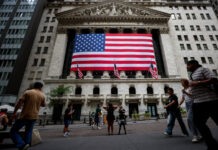
Brazil’s central bank will likely leave interest rates unchanged on Wednesday, in the first decision by a new board expected to exercise caution in the face of political uncertainty and high inflation expectations.
All but one of 43 economists in a Reuters poll expect the bank to hold its benchmark Selic rate BRCBMP=ECI at 14.25 percent for the eighth consecutive time. One expects a 50 basis-point cut.
Even with a recession well into its second year, new central bank governor Ilan Goldfajn has vowed to maintain rates at near 10-year highs to curb inflation expectations in a country scarred by bouts of hyperinflation as recently as the early 1990s.
Goldfajn and the four new members of the nine-seat board have tied future rate cuts to the approval by a divided Congress of measures to cap public spending and reduce pension benefits.
The central bank said on Wednesday that it will publish the rate decision exclusively online right after the monetary policy meeting at around 6 p.m. (5 p.m. EDT/2100 GMT), rather than the traditional reading of a statement by a central bank spokesman.
It said it will also alter the format of both the decision statement and minutes but gave no more details. Investors are expected to carefully parse the statement for any hints of how long Goldfajn plans to keep rates on hold.
“Continued high inflation expectations combined with a complex political environment – with some uncertainty regarding the passage of economic reforms, mainly those related to fiscal policies – remain barriers to monetary flexibility,” Sao Paulo-based broker Brasil Plural said in a research note.
The tough inflation-fighting stance of Goldfajn, who quit as Itau Unibanco chief economist to lead the central bank in June, has largely prompted economists to push back their expectations for an initial rate cut to October.
However a few economists believe the bank may start cutting rates only in November, if inflation expectations remain high.
Interim President Michel Temer, who has replaced leftist President Dilma Rousseff while she stands trial for allegations that she broke fiscal rules, is working to build congressional support for unpopular economic reforms.
Annual inflation will most likely end the year above the official target range of between 2.5 percent and 6.5 percent, but Goldfajn has promised to do whatever is necessary to reduce it to 4.5 percent in 2017.
Annual inflation probably dropped slightly in mid-July but remained close to 9 percent as high food prices continued to offset a drop in items such as healthcare and clothing.
Source: Reuters












